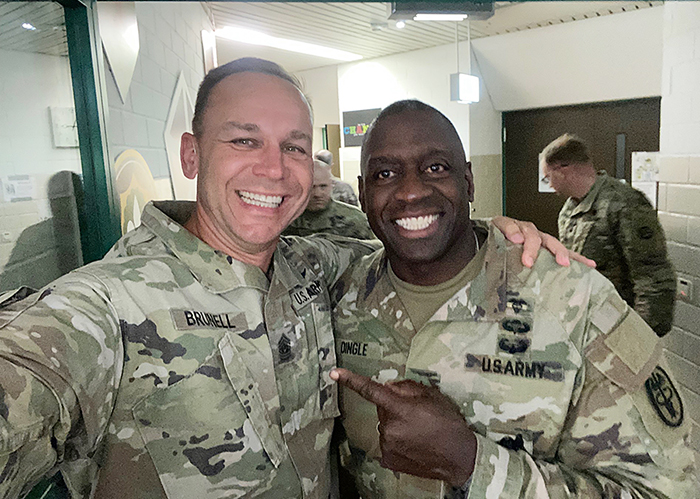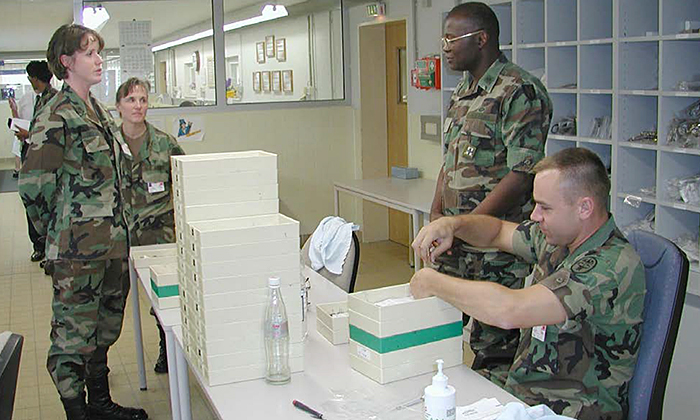New Setting, Same Focus as Brunell Arrives at USAMRDC

Command Sgt. Maj. Kyle Brunell wants to tell you something. In fact, he wants to tell you anything – anything at all, anything that pops into his mind over the course of the day. Strike up a conversation with him and in just mere seconds his personality reveals itself in full: excitable, gregarious and eager to find out what he can do to help keep the mission on track. After 30-plus years in the Army, he says chatting up anyone within earshot is still one of the best – and most important – parts of being a Soldier.
"I'm a talker," he says during a late August phone conversation from Sembach, Germany, where he previously served at Regional Health Command – Europe. "I love to talk, I love to get involved – and I've found that's a big key to leadership, too: if you want people to follow you, you have to show them who you are and that you care."
As the new Command Sgt. Maj. for the U.S. Army Medical Research and Development Command, he'll have plenty of opportunity to do that and more, stepping in as the chief advocate of the more than 5,600 military and civilian personnel at Fort Detrick. To hear him tell it, an opportunity like this one was considered the longest of longshots when he first joined the Army in 1991, enlisting from a tiny town in eastern New York.
"When I think about being a Command Sergeant Major – and now, for me, being a Senior Enlisted Leader for the first time at a post like Fort Detrick – young private Brunell never thought this kind of achievement would have ever been possible," says Brunell.
His dreams becoming a reality are a testament to his hard work and vision; equal doses of both combining to form a single, direct pathway to success. For Brunell, that pathway revealed itself shortly – and quickly – after joining the Army, when he became a 42E (an Optical Laboratory Specialist – a position now referred to as a 68H). At the time, he was content to simply wear a lab coat for the rest of his career, making eyeglasses and drilling down into the details of ocular health. Instead, he was soon asked to become a detachment sergeant, then a first sergeant, then given a leadership role at a community hospital and then assigned to a medical center as a command sergeant major. During this period, he also found the time to return Hudson Valley Community College (the same school he left to enlist in the Army) to receive his degree – an accomplishment he'd later top by earning a Master's degree from the University of Texas at El Paso.
If all that sounds like a blur – and Brunell admits it certainly felt that way at the time – he's quick to note that climbing both the service and higher education ranks at the same time gave him a unique perspective on leadership and what it takes to lead a team of individuals.

"Here's what leadership is," says Brunell, "you want to think of all the things that people have done in your life that you've hated – and never do them. Conversely, you want to think of all the things people have done in your life that you've loved – and do those things."
Cut to 30-plus years of service later and it's clear that this relatively simple advice has served Brunell well, putting him in the position to both succeed personally and enable the success of others along the way. He started his assignment at RHCE in 2020 – during the height of the COVID-19 pandemic, no less – and soon thereafter spearheaded a vaccination campaign that not only included all Soldiers stationed at RHCE but also the more than 10,000 refugees from Afghanistan flown to Ramstein Air Base in southwestern Germany in the summer of 2021. The way his friends see it, tackling the biggest of big jobs is what Brunell is made for.
"He is enthusiastic about the work he does, and by that I mean he pours himself into his job in an attempt to make things better than how he found them," says Terrance Alligood, Jr., who currently serves as chief of the Medical Materiel Sourcing Division at the U.S. Army Medical Materiel Agency. "Along with that enthusiasm, he is also always motivated – and further motivates others to be better versions of themselves."
Notably, Alligood and Brunell were actually stationed together at the U.S. Army Medical Materiel Center – Europe back in Brunell's early days as 68H. Alligood paints a picture of his friend as a natural leader and organizer; an asset to every endeavor. To wit, he points out that Brunell was deployed to Afghanistan as the first sergeant of an air medevac company despite not being a traditional Combat Medic Specialist. The end results were, according to Alligood, predictably exemplary.
"He performed flawlessly," says Alligood, who's known Brunell for 20 years. "He earned the trust and respect of his highly skeptical commander and Soldiers, and took a unit that had a high percentage of disciplinary issues and turned it around into an effective and cohesive unit."
For Brunell, it's all part of the job: the busy schedule, the shifting demands, the long hours. He's come a long way since eastern New York, he likes to say. And so while stepping into his new role at USAMRDC will put him slightly closer to his home state, he still plans to tackle the position with all the fervor of a man in a brand new place – one eager to make an impression. After all, those are the stakes – and even better for Brunell, that's the game he plays best.
"MRDC is a special organization," he says. "I can't wait to be able to represent all these hardworking individuals – not just the Soldiers, but the scientists and researchers – all the people helping to ensure we succeed on the future battlefield. It's a huge honor and a huge responsibility."
 An official website of the United States government
An official website of the United States government
 ) or https:// means you've safely connected to the .mil website. Share sensitive information only on official, secure websites.
) or https:// means you've safely connected to the .mil website. Share sensitive information only on official, secure websites.


